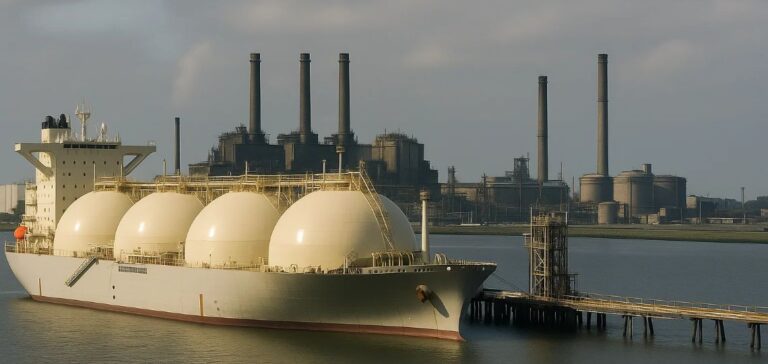The European Commission has unveiled a plan to eliminate all imports of Russian gas by the end of 2027. This marks a new step in the European Union’s energy policy, three years after the start of the war in Ukraine. Russian gas still accounted for 9% of the Union’s gas consumption between January and April 2025, according to consultancy firm Kpler.
A gradual yet incomplete withdrawal since 2021
Before the Ukraine conflict, Russia supplied 45% of the European Union’s gas imports, combining deliveries by pipeline and liquefied natural gas (LNG). In 2024, Russia remained the Union’s second-largest gas supplier after Norway, accounting for 18% of pipeline deliveries and 20% of LNG imports, according to the Institute for Energy Economics and Financial Analysis (IEEFA).
Russian gas continues to be used for household heating, industrial processes and electricity generation. Despite the decline in pipeline flows, particularly with the cessation of transit via Ukraine on January 1, 2025, Russian LNG volumes delivered to European ports have not stopped.
A strategy centred on LNG
The EU turned heavily to LNG following the 2021 energy crisis. In 2024, 37% of the Union’s gas imports came from LNG, compared to 63% via pipelines. However, the LNG market remains tight. Analyst Jan-Eric Fähnrich from Rystad Energy noted that a global LNG oversupply is not expected until 2028.
The United States, which supplies 45% of Europe’s LNG imports, remains the EU’s main partner, followed by Qatar. Norway, North Africa, and potentially Mozambique could also help diversify supplies. European Commissioner for Energy Dan Jorgensen stated the EU aims to avoid any new dependency, including on Washington.
Legal and political hurdles
The plan outlines a ban on new contracts and existing short-term agreements with Russian companies by the end of 2025. A full halt to imports is set for 2027. This roadmap, now under review by the European Parliament and member states, faces sensitive negotiations. Some countries, such as Hungary, which maintain close ties with Moscow, may resist the proposal.
Brussels is opting for a legislative proposal requiring a qualified majority, rather than sanctions that would necessitate unanimity among the 27 member states. Part of the existing contracts, including those with Shell, TotalEnergies, SEFE and Naturgy, may raise legal questions regarding termination.
Concentrated flows and residual reliance
The International Energy Agency reported that Belgium, France and Spain received 85% of all Russian LNG imports since the beginning of the year. A portion of these volumes was subsequently re-exported to other European countries, raising questions about traceability and the effective implementation of the plan.
“By 2028, we should enter a phase of global LNG oversupply,” Jan-Eric Fähnrich told AFP, while noting that ongoing projects would not be operational until 2026 or 2027.






















